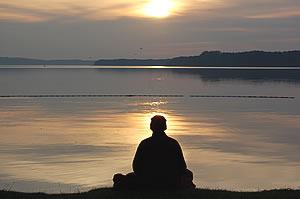
In the Buddhist tradition, the purpose of taking refuge is to awaken from confusion and associate oneself with wakefulness. Taking refuge is a matter of commitment and acceptance and, at the same time, of openness and freedom. By taking the refuge vow we commit ourselves to freedom.
There is a general tendency to be involved in all kinds of fascinations and delusions, and nothing very much ever takes root in one’s basic being. Everything in one’s life experience, concerning spirituality or anything else, is purely a matter of shopping. Our lives consist of problems of pain, problems of pleasure, problems of points of view—problems about all kinds of alternatives—which make our existence complicated.
We have allegiance to “that” and allegiance to “this.” There are hundreds and millions of choices involved in our lives-particularly in regard to our sense of discipline, our ethics, and our spiritual path. People are very confused in this chaotic world about what is really the right thing to do. There are all kinds of rationales, taken from all kinds of traditions and philosophies. We may try to combine all of them together; sometimes they conflict, sometimes they work together harmoniously. But we are constantly shopping, and that is actually the basic problem.
It is not so much that there is something wrong with the traditions that exist around us; the difficulty is more our own personal conflict arising from wanting to have and to be the best. When we take refuge we give up some sense of seeing ourselves as the good citizen or as the hero of a success story. We might have to give up our past; we might have to give up our potential future. By taking this particular vow, we end our shopping in the spiritual supermarket. We decide to stick to a particular brand for the rest of our lives. We choose to stick to a particular staple diet and flourish on it.
When we take refuge we commit ourselves to the Buddhist path. This is not only a simple but also an extremely economical approach. Henceforth we will be on the particular path that was strategized, designed, and well thought-out twenty-five hundred years ago by the Buddha and the followers of his teaching. There is already a pattern and a tradition; there is already a discipline. We no longer have to run after that person or this person. We no longer have to compare our lifestyle with anybody else’s. Once we take this step, we have no alternatives; there is no longer the entertainment of indulging in so-called freedom. We take a definite vow to enter a discipline of choicelessness—which saves us a lot of money, a lot of energy, and lots and lots of superfluous thinking.
Perhaps this approach may seem repressive, but it is really based on a sympathetic attitude toward our situation. To work on ourselves is really only possible when there are no side-tracks, no exits. Usually we tend to look for solutions from something new, something outside: a change in society or politics, a new diet, a new theory. Or else we are always finding new things to blame our problems on, such as relationships, society, what have you. Working on oneself, without such exits or sidetracks, is the Buddhist path.
By taking refuge, in some sense we become homeless refugees. Taking refuge does not mean saying that we are helpless and then handing all our problems over to somebody or something else. There will be no refugee rations, nor all kinds of security and dedicated help. The point of becoming a refugee is to give up our attachment to basic security. We have to give up our sense of home ground, which is illusory anyway. We might have a sense of home ground as where we were born and the way we look, but we don’t actually have any home, fundamentally speaking. There is actually no solid basis of security in one’s life. And because we don’t have any home ground, we are lost souls, so to speak. Basically we are completely lost and confused and, in some sense, pathetic.
These are the particular problems that provide the reference point from which we build the sense of becoming a Buddhist. Relating to being lost and confused, we are more open. We begin to see that in seeking security we can’t grasp onto anything; everything continually washes out and becomes shaky, constantly, all the time. And that is what is called life.
So becoming a refugee is acknowledging that we are homeless and groundless, and it is acknowledging that there is really no need for home, or ground. Taking refuge is an expression of freedom, because as refugees we are no longer bounded by the need for security. We are suspended in a no-man’s land in which the only thing to do is to relate with the teachings and with ourselves…
Keep reading: Click here




